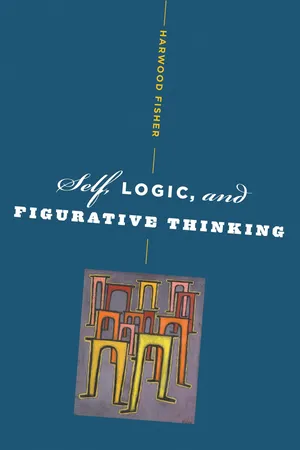Self, Logic, and Figurative Thinking
About this book
Harwood Fisher argues against neuroscientific and cognitive scientific explanations of mental states, for they fail to account for the gaps between actions in the brain, cognitive operations, linguistic mapping, and an individual's account of experience. Fisher probes a rich array of thought from the primitive and the dream to the artistic figure of speech, and extending to the scientific metaphor. He draws on first-person methodologies to restore the conscious self to a primary function in the generation of figurative thinking.
How does the individual originate and organize terms and ideas? How can we differentiate between different types of thought and account for their origins? Fisher depicts the self as mediator between trope and logical form. Conversely, he explicates the creation and articulation of the self through interplay between logic and icon. Fisher explains how the "I" can step out of scripted roles. The self is neither a discursive agent of postmodern linguistics nor a socially determined entity. Rather, it is a historically situated, dynamically constituted place at the crossroads of conscious agency and unconscious actions and evolving contextual logics and figures.
Tools to learn more effectively

Saving Books

Keyword Search

Annotating Text

Listen to it instead
Information
Table of contents
- Table of Contents
- Preface
- Introduction: Major Terms, Their Classification, and Their Relation to the Book's Objective
- 1. The Problem of Analogous Forms
- 2. Natural Logic, Categories, and the Individual
- 3. Shift to Individual Categories, Dynamics, and a Psychological Look at Identity
- 4. Form Versus Function
- 5. What Is the Difference Between the Logic Governing a Figure of Speech and the Logic That Is Immature or Unconscious?
- 6. What Are the Role and Function of the Self Vis-à-vis Consciousness?
- 7. Development in the Logic from Immature to Mature Modes
- 8. Pathological and Defensive Logical Forms
- 9. The "I," Identity, and the Part-Whole Resolutions
- 10. The "I," Entropy, and the Trope
- Notes
- References
- Acknowledgments
- Index
Frequently asked questions
- Essential is ideal for learners and professionals who enjoy exploring a wide range of subjects. Access the Essential Library with 800,000+ trusted titles and best-sellers across business, personal growth, and the humanities. Includes unlimited reading time and Standard Read Aloud voice.
- Complete: Perfect for advanced learners and researchers needing full, unrestricted access. Unlock 1.4M+ books across hundreds of subjects, including academic and specialized titles. The Complete Plan also includes advanced features like Premium Read Aloud and Research Assistant.
Please note we cannot support devices running on iOS 13 and Android 7 or earlier. Learn more about using the app
